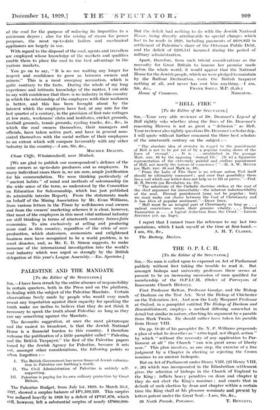PALESTINE AND THE MANDATE
[To the Editor of the SPECTATOR.] SIR,—I have been struck by the entire absence of responsibility in certain quarters, both in the Press and on the platform, in dealing with the subject of the Palestine Mandate. Certain observations freely made by people who would very much resent any imputation against their capacity for speaking the truth make me incline to believe that they do not think it necessary to speak the truth about Palestine so long as they can say something against the Mandate.
The favourite suggestion, at once the most picturesque and the easiest to broadcast, is that the Jewish National Home is a financial burden to this country. I therefore welcome the publication of a little pamphlet called " Palestine and the British Taxpayer," the first of the Palestine papers issued by the Jewish Agency for Palestine, because it sets out, amongst other considerations, the following points so often forgotten :-
I. The British Government has never financed Jewish coloniza- tion in Palestine one farthing's worth.
II. The Civil Administration of Palestine is entirely self- supporting.
III. Palestine is paying for its own military protection by Great Britain.
The Palestine Budget, from July 1st, 1920, to March 31st, 1927, showed a surplus balance of £P1,592,228. This surplus Was reduced heavily in 1928 by a deficit of £P797,676, which still, however, left a substantial surplus of nearly £P800,000.
But the deficit had nothing to do with the Jewish National Home, being directly attributable to special charges which had to be made in 1928, including payments of £648,823 in settlement of Palestine's share of the Ottoman Public Debt, and the deficit of £206,541 incurred during the period of military administration.
Apart, therefore, from such trivial considerations as the necessity for Great Britain to honour her promise made before the whole world, it would appear that the National Home for the Jewish people, which we were pledged to maintain by the Balfour Declaration, costs the British taxpayer nothing at all, and never has cost him anything.—I am,
House of Commons. Nuneaton.












































 Previous page
Previous page